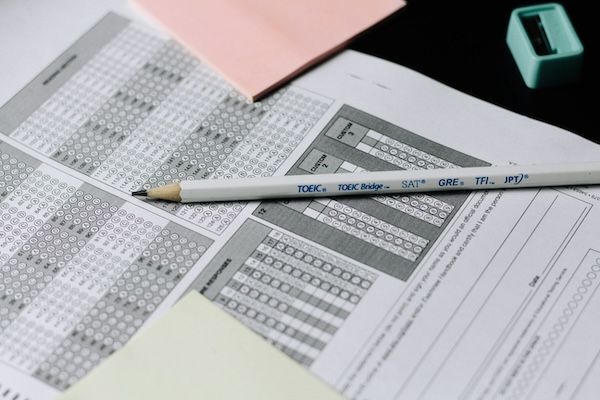![ACT Test Changes: What You Need to Know [2026] ACT Test Changes: What You Need to Know [2026]](/_next/image?url=https%3A%2F%2Fcdn.sanity.io%2Fimages%2F7i1ps9pf%2Fproduction%2F5e798ffe02555cd6702a908613e807469080575e-600x400.jpg&w=3840&q=75)
ACT Test Changes: What You Need to Know [2026]
On July 15, 2024, the CEO of the ACT released upcoming changes to the ACT test. These changes went into effect for students taking the digital exam beginning in Spring of 2025 and students taking the in-person exam beginning Spring of 2026.

Photo by Nguyen Dang Hoang Nhu on Unsplash
This blog was originally published on July 29, 2024. It has been updated with the most recent information.
On July 15, 2024, the CEO of the ACT released upcoming changes to the ACT test. These changes went into effect for students taking the digital exam beginning in Spring of 2025 and students taking the in-person exam beginning Spring 2026.

Photo by Ben Mullins on Unsplash
What are the changes to the ACT?
Two key changes happened for the ACT in 2025. Number one, the test is shorter by up to ⅓. The new core exam will be 2-hours, compared to the previous 3-hours. The test will contain 44 fewer questions and the reading and English sections will feature shorter passages. Number two, the current science section will become optional, like the current writing section.
This new version of the ACT went into effect in the spring of 2025 for those opting for the digital test, and the spring of 2026 for those choosing the paper and pencil version.
Should I retake the ACT with the new changes?
Not if you're a senior. The changes will not go into effect until after the admissions cycle of the 2025/26 school year is complete.
Rising 11th graders may be tempted to try the new, shorter ACT, and many will be thrilled to try the test without the science section. The decision about whether to retake the ACT once the new version is released should be made on a case by case basis, and ideally, once practice tests and some statistics from the first test date are released. If we look at the currently available data representing SAT scores before and after that test was made shorter this year, we can see that it’s actually more difficult to get a very high score (1500 or above) on the new, digital SAT. Since there are fewer questions, each question you get wrong costs you more points in the new test versus the older, longer test. We expect to see this trend with the new ACT also.
Will colleges stop using ACT?
There’s no reason to think that colleges and universities will stop using the ACT due to the changes. Both the ACT and its counterpart, the SAT, are considered valid predictors of student success in college. That being said, over 80% of colleges and universities in the United States are test optional, meaning it’s up to you if you submit your scores with your application materials. Many of the Ivy League schools and other competitive colleges, however, continue to use them when evaluating students and many still require the test. For most college-bound students who are applying to any competitive college or university, taking the ACT or SAT still matters and can help make your application stand out when progress is shown from the first time you take the exam to the second or third.

Photo by Annie Spratt on Unsplash
Should I take the ACT?
Deciding whether or not to take the ACT is a personal decision. The upcoming changes to the test do not change its importance or role in college admissions. If you’re trying to decide between the ACT or SAT, check out the differences to determine which is the best fit for you. We recommend starting with a diagnostic test and, depending on which test you like better, only preparing for one test, the SAT or ACT. That being said, many college-bound students shied away from the ACT because of the daunting science section and the time pressure of the test when compared to the SAT. With the science section becoming optional and some of the time pressure relieved, it is possible more students will opt for the ACT test.
How long is the ACT test?
For April, June and July 2025 exam dates, the paper ACT test is still a 3-hour long core exam with an optional writing section, and can be taken either in person or online. Beginning with the April 5, 2025 exam, the digital ACT test will be 2-hours for the core exam, with additional, optional sections in science and writing. The paper test (in-person) will remain change to the shorter test for the September 6,2025 exam. Beginning in the spring of 2026, both the digital and in-person ACT test will be 2-hours for the core exam, with additional, optional sections in science and writing for the national test dates as well as school districts.
How will the digital ACT affect ACT scores?
The ACT began offering a digital option in February 2024. It is not expected to significantly affect scores as it is identical to the paper version. Some students will feel more comfortable taking the digital version which may influence their scores slightly, but are unlikely to dramatically improve them.
The new digital version beginning in spring 2024 may influence scores. The ACT has said they are not changing the difficulty level of the questions, but students will have more time to answer each question, meaning that some students may see a bump in score. However, as noted above, with fewer questions, it may be more difficult to achieve top scores like 34 or 35 (out of a maximum of 36 per section) when each question holds more weight. Students who struggled with the science section will also likely see a stronger score now that it will no longer be part of the core test. Also, unlike its digital SAT counterpart, the digital version of the ACT is not adaptive and has no plans to be so.

Photo by Nguyen Dang Hoang Nhu on Unsplash
How is the digital ACT different from the paper ACT?
Currently there is no difference between the digital ACT and paper ACT, though students who take the digital version may receive their scores faster. Beginning in spring 2026, both the digital ACT and the paper ACT will have the same shortened format.
How is the digital ACT different from the digital SAT?
There are several key differences between the digital ACT and the digital SAT. For starters, the SAT allows students to take the exam on a personal computer, while the ACT requires students to take the exam at a pre-approved testing center on the center’s computers. Most importantly, however, is the way the test works. The digital version of the ACT is identical to the paper version and both versions remain available to students. The SAT, however, is completely digital. As of March 9, 2024, the SAT no longer offers a paper version of its exam. Additionally, the SAT is now an adaptive test, meaning that how students perform on the first section of a subject determines the difficulty of the second section in that same subject, and ultimately the score the student can receive. Lastly, the new ACT will have 3 sections (English, Reading, Math) plus the optional 4th science section while the SAT continues to have 2 sections (Reading/Writing and Math) broken up into 4 modules with the 2nd module in each section being easier or harder depending on how you do on the 1st module of that section.
Should I take the optional science section of the ACT?
Deciding whether or not to take the newly-optional ACT science section is a personal decision and each student must weigh the pros and cons before deciding. Historically, the science section of the ACT has proven to be the most difficult section for many students. This is because it is a dense reading section that asks students to analyze charts and graphs. Many students have never seen questions like this before, so it takes them a while to get used to them. In addition, this section is notoriously hard to finish in the allotted time. However, with the new test promising fewer questions in each section, some of the time pressure may be off!
If deciding to skip the science section in the new ACT, your score will be easier to compare to those taking the SAT. Not taking the section will not hurt your chances of being admitted to a top university.
Conversely, choosing to tackle the unique and challenging science section on the ACT and doing well on it may send the message that you are not afraid of a challenge and that you want to set yourself apart from those who choose not to do the science section. Another good reason to take the science section is to show prospective colleges that you are interested in the sciences. Since SAT subject tests were canceled and many schools no longer support AP tests, the science section of the ACT will remain one of the only ways to show competence in the sciences in a standardized testing environment.
Need help deciding which test to take, ACT or SAT? Struggling to overcome a score plateau? Working with Ivy Tutors to reach your ideal score. Consider starting with a mock test.




